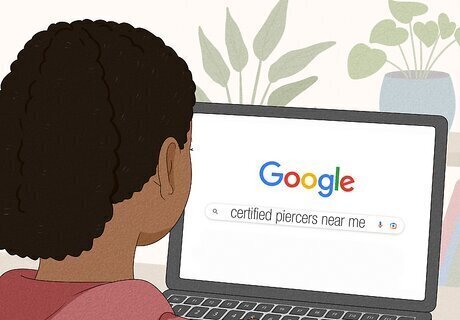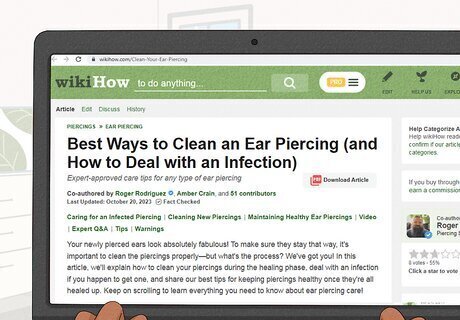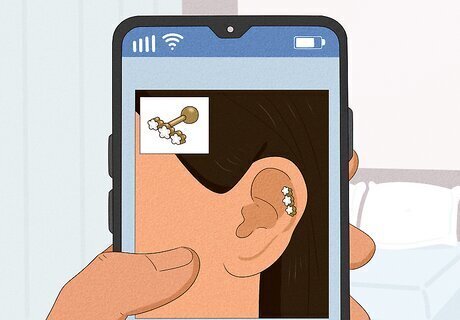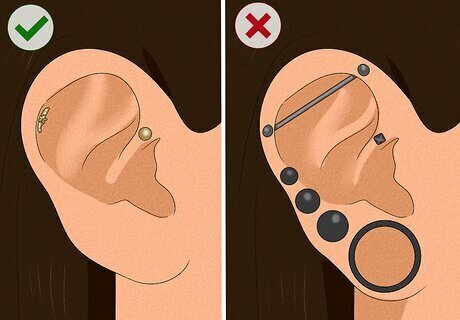
views
- Practice what you’ll say ahead of time, and broach the subject when your parents are in a good mood.
- Ask the question calmly and directly without dancing around the issue. Be patient to show them you’re mature.
- Give them the specifics, like what piercing you want, what shop you’ll go to, and how you’ll take care of it. Remind them that they already let you get one piercing.
Reasoning with Them

Practice what you’ll say, and pick a good time to say it. Knowing what you’ll say beforehand helps you to stay on track and deliver your pitch and reasoning without a hiccup. Write down a script and say it aloud in the mirror. Then, choose a time when your parents are in a good mood, which will make them more receptive. Avoid asking when they’re tired or stressed, like when they just get home from work.

Ask kindly, patiently, and directly. Parents put up their guards when you dance around the subject or try to butter them up, so come right out with it! Simply ask your parents for what you want, and explain why it’s important to you. Let them know whatever is involved, like a parent signature. Listen to their questions, and respond calmly with all the information you have. You can say: “Mom, Dad, I want to get another ear piercing. It’s my favorite way to express myself, and I’d really like your permission to get it done.” Or, say, “Hey Mom. I’ve been thinking that I want another piercing, but I wanted to make sure it’s okay with you first.”

Tell them exactly what kind of piercing you want. There are a lot of different types of ear piercings, like a tragus, or a rook and helix. Show your parents you’ve researched and thought a lot about the placement and jewelry you can wear for it. Use every opportunity to show them that you’ve put thought into it. For example, say: “I would really like a helix piercing, which is at the top cartilage part of the ear.” Also show them a diagram of ear piercing placement to help them visualize what the piercing would be like on your ear. If you know of any online stores with the jewelry you want for the piercing, show them to your parents.

Remind them that they have allowed piercings before. When persuading your folks, point out that they’ve given their permission for your previous ear piercings, and this one will be no different. That said, avoid challenging their judgment or saying things like, “What changed?” or “How is this different?” which may backfire. If you’ve gotten your earlobes pierced once, for example, explain that a second lobe piercing is essentially the same thing, with the same method for piercing and same healing time. For example, you might say, “I thought it wouldn’t be a big deal, since I already have one, but I wanted to be sure.”

Highlight your accomplishments to boost your case. Pro piercer Roger Rodriguez says to remind them of anything that’ll give you “extra points toward them saying yes,” especially things like good grades. Other things like extracurriculars, volunteer work, or helping around the house also helps persuade them that you’ve earned it. If you have a birthday or other gift-giving holiday coming up, you can say that the ear piercing you want is at the top of your wish list for gifts.

Explain that ear piercings aren’t permanent. Let your parents know that you plan to keep this piercing forever, to convince them of how much you want it. But also say that, if they’re concerned about the permanent nature of piercings, piercing holes naturally close over time if you really decide you don’t want them anymore. Note gauges do require minor surgery to close stretched ear piercings.

Offer to wait for an answer, or for another opportunity. Be patient to prove to your parents that this is a piercing you will want to keep forever. If they say no the first time you ask, try to agree on a later time you can reopen the issue with them. Or, wait a couple weeks or months to come back with them with a new argument. You might say: “You don’t have to give me an answer right now. Can I ask you for your answer tomorrow, after you’ve thought about it?” Or, if they say no, ask them with a new strategy or angle. If they denied a piercing in return for good grades, wait until you’ve accomplished something else, then use that as leverage.
Showing them Facts and Evidence

Find a quality piercer with good reviews. Professional piercer Roger Rodriguez says to find “a studio that has a reputable business and name” and “to see what their policy is in piercing a minor.” Search online for piercing places that are certified and licensed by the state. Let your parents know that you’ve done your research and that you are going to a reputable piercer. Also, call or visit the location to verify the cleanliness and safety of the building, equipment, and staff. Have your parents accompany you or talk to the staff of a piercing place themselves, if they want to. A piercer who requires a guardian’s permission to pierce minors is generally more trustworthy and favorable to parents. Make sure to check Google, Yelp, or other sites with ratings and reviews from real people to see what they have to say about their experience at the piercing place.

Research proper cleaning and care. Show your parents that you will put in the work to properly care for and heal your ear after piercing. Share all cleaning and care information, like washing instructions and healing time, so they know that you’re informed and prepared. Also put together a list of things you’ll need, like saline solution, spare jewelry, and petroleum jelly. This shows your parents that you’re organized and on top of it. Make sure you know the best and healthiest types of metal for ear jewelry, how long to wear them for, and where to buy them, especially if you have an allergy to certain metals like nickel.

Talk about health concerns openly and honestly. Research the health concerns of ear piercings to show to your parents. Be honest about the possible complications, like infections or keloids. Also be prepared with research on how to prevent problems. This shows that you’re realistic and responsible. Say something like, “I’ve researched the risks, how to prevent them, and what to do if something goes wrong, so you don’t have to worry about it yourself.” Remind them that you already have experience with the risks, too, since you already have a piercing. If it went well the first time, that’s bonus evidence.

Show them pictures of the piercing to help them visualize it. Find pictures online of the type of piercing you want to get to show them different options for how it could look on you. You might even ask what type of piercing they might prefer you get, to give them a say in it. Look for high-quality images and examples with classy, simple jewelry to help show that the piercing can have a dignified and mature look that you won’t grow out of.

Have them talk to friends with piercings. Ask trusted friends who have the piercing, or a piercing like it, to show it to your parents. Have them explain why they got it and why they like it, and what the process was like. If your friend and their parents are willing, they can discuss with your parents why to let you get the piercing. Make sure your friend and their parents are willing and give you permission before you tell your parents that they can talk to them.
Bargaining for a Piercing

Exchange the piercing for chores or good grades. Don’t nag, but do make your parents an offer. You might agree to clean your room and the kitchen every week, get all As and Bs on your next report card, or another similar deal that you and your parents can agree on in exchange for their permission. Or, agree to participate in volunteer or extracurricular activities if that’s something your parents want you to do more of. Give your parents something specific, both to show that you’re willing to work for what you want and that you can make specific goals. For example, rather than saying, “I’ll work on getting better grades,” say “I’ll get better grades in Math,” or whatever subject could use some improvement.

Offer to pay for the piercing yourself. Tell your parents that you’ll pay for the cost of piercing, jewelry, and cleaning supplies, so they don’t have to. Research all the costs ahead of time and save up your own money from an allowance or a job so you have the full amount ready to offer as soon as your parents agree to give their permission. Try raising the money with a lemonade stand or other simple fundraising activity that your parents approve of. If you can’t save or raise the entire amount of money yourself, ask if your parents will chip in the rest. Say: “Dad, I have enough money to pay for the piercing itself. Will you chip in for the cost of the jewelry?”

Set limits on how many more piercings you’ll get. Promise not to get any more piercings after this one, or set a limit for the number of piercings that your parents are comfortable with. You can also agree with your parents on wearing a certain type of jewelry in the piercing, like smaller studs instead of dangly or large earrings. If you’re going for gauged ears, agree on a size that you won’t go over when stretching.

Ask them to (or let them) come with you. Tell your parents that they can come with you to the piercing place, either beforehand to check it out, during and throughout the piercing process, or both. This gives them peace of mind, and lets them feel involved. Asking your parents to come can be a great way to sell it as a bonding activity. Also ask your parents if they want to get their own piercing with you! They may appreciate this effort to include them and experience exactly what you’re experiencing.

Create a contract or agreement. Whatever bargaining tactic you decide on or agreements you come up with, write them down or type them out as a way of showing them you are making a well-thought-out decision that you’re committed to sticking to. Make a checklist or a step-by-step process for everything you’ve agreed to do to get the piercing and what’s required afterward.




















Comments
0 comment